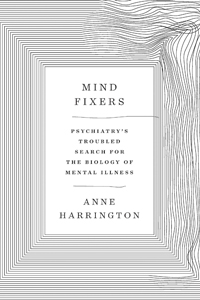 Anne Harrington, Mind Fixers: Psychiatry's Troubled Search for the Biology of Mental Illness (New York: W.W. Norton, 2019), 366pp.
Anne Harrington, Mind Fixers: Psychiatry's Troubled Search for the Biology of Mental Illness (New York: W.W. Norton, 2019), 366pp.
One standard narrative of the history of psychiatry is that around 1980, after dominating the field for fifty years, the "wasteland" and "nonsense" of the Freudian model of mental illness was displaced by a new and revolutionary medical model that searched for causes and cures in a strictly biological manner, just like it did in cancer or heart disease. Psychoanalytic talk therapy gave way to neurobiology, genetics, and pharmacology; the focus moved from the unconscious mind to the physical brain. In the fall of 1988, for example, Samuel Guze gave a lecture in London with the title "Biological Psychiatry: Is There Any Other Kind?" In this "simple explanatory story," says the Harvard historian of science Anne Harrington, there are heroes and villains, and a happy ending. "The only trouble with this story," though, "is that it is wrong—not just slightly wrong but wrong in every particular."
In her harsh and even inflammatory critique of the history of psychiatry, brain scientists of the early twentieth century did not "fall victim" to the rise of Freud and his minions. Rather, the earlier attempt to find physical causes for mental diseases "failed on its own terms." Many diagnoses back then were dubious—personal weakness, bad habits, bad heredity, germs, bad mothers, immorality, metabolism, etc. Some treatments were terrifying—lunatic asylums, physical restraints, seclusion rooms, hypnosis, religious "mind cure," colonic irrigation, organ extraction, induced malarial fevers, insulin induced comas, drug induced shock treatments, electric shock treatment, lobotomies (which procedure won a Nobel Prize), sterilization, and, of course, "then the drugs."
Despite its promises, the post-Freudian biological revolution has failed miserably. "For make no mistake: today one is hard pressed to find anyone knowledgeable who believes that the so-called biological revolution of the 1980's made good on most or even any of its therapeutic and scientific promises… It is now increasingly clear to the general public that it overreached, overpromised, over diagnosed, overmedicated, and compromised its principles." Even the meaningful findings and advances of the last forty years have proven hard to replicate and interpret. With separate chapters on schizophrenia, bipolar disorder, and depression, Harrington shows how for people suffering from mental illness there have been few improvements in diagnosis and treatments. Instead, there's been a big gap between promises and reality. Big Pharma, once the target of "moral outrage," has abandoned the field. The front line drugs prescribed today are often fifty or more years old. The DSM-5 (2013) of the American Psychiatric Association—the bible of psychiatry, is now considered by many to be a disaster.
I mentioned reading this book to a friend who's a neurobiologist at Stanford. His response was telling. "It's a pretty dismal field of medicine," he said. "The human brain/mind/body nexus is extremely complex and very hard to study well." We need a new narrative, says Harrington, and that starts with "honest talk" about the last hundred years.
For more on this important theme of mental illness, see my reviews of the books by Robert Kolker, Hidden Valley Road: Inside the Mind of an American Family (New York: Doubleday, 2020); A.K. Benjamin, Let Me Not Be Mad: My Story of Unraveling Minds (2019); Kathryn Greene-McCreight, Darkness Is My Only Companion; A Christian Response to Mental Illness (2006); the many books by the neurologist Oliver Sacks; and then the movies I Am Maris (2018), Tarnation (2003), and Love and Mercy (2014).
Dan Clendenin: dan@journeywithjesus.net


